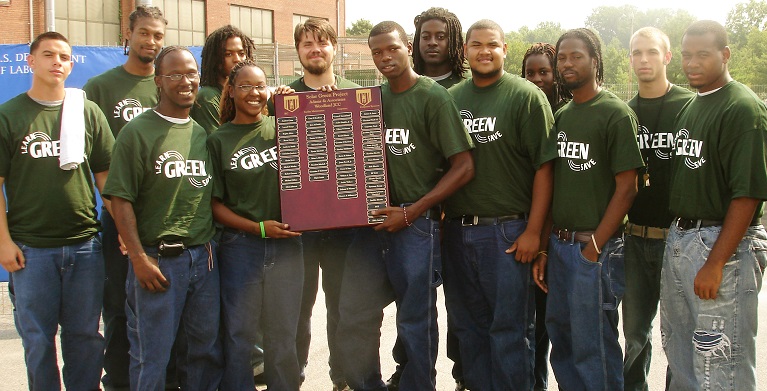Groundbreaking Partnership Offers Solar Training Program

The crowd enjoyed shaded seating beneath a yellow and white canopy at the Woodland Job Corps Center in Laurel, Maryland, while listening to speakers describe the groundbreaking initiative involving Anne Arundel Community College, the federal Job Corps site, and the Independent Electrical Contractors Chesapeake chapter. The ceremony ended with a green twist: instead of the traditional ribbon-cutting ceremony with giant scissors and a ribbon, the crowd enjoyed a "Flip the Switch" activation of the car-sized solar panels beside the tent.
The Woodland site is the first in the nation to offer its students the option of photovoltaic installation training, thanks to its long-standing partnerships with Anne Arundel Community College (AACC) in Arnold, Maryland, and the IEC Chesapeake chapter. An estimated 75 Woodland Job Corps students will undergo the training annually.
"This is just the kind of program the country needs," said event keynote speaker Congressman John Sarbanes, one of several federal officials attending the ceremony. He congratulated Woodland Job Corps students attending the event for participating in training that will help America convert to alternative and sustainable energy and improve the environment.
In another first, this fall AACC will offer photovoltaic installation training classes to the public. The college is the first community college in Maryland to do so, thanks to its partnership with the IEC Chesapeake chapter. Students who successfully pass the exam at the end of the course will receive entry-level certification by the North American Board of Certified Energy Practitioners.
"We expect these open-enrollment, noncredit continuing education classes will appeal most to electricians, carpenters, and others in the construction arena who want to specialize in solar installation or advance their careers with a new skill," said Faith Harland-White, dean of AACC's school of continuing and professional studies. "They are also a great place for career changers to get the skills needed to work in this field."
Job Corps is a no-cost education and career technical training program administered by the U.S. Department of Labor. It serves more than 60,000 low-income students annually at 122 centers in 48 states, Washington, D.C., and Puerto Rico.
This residential program for underserved students, ages 16 to 24, allows them to earn a high school diploma or GED while undergoing career training.
The idea to simultaneously offer AACC's new training program to the Woodland Job Corps was embraced by the partners, who enjoy a strong relationship with AACC, Harland-White said. "This is an outgrowth of visionary leadership on the part of all of the partners. All of the partners recognize the need in the Mid-Atlantic region to get workers trained in this emerging field."
The college has teamed up with Job Corps for 11 years to provide instruction to nearly 500 students annually at the Woodland site and a site in Woodstock, Maryland. AACC also partners with the two Job Corps sites to offer training in business technology, culinary arts, electrical pre-apprentice, hotel and lodging, retail sales, and welding. And, AACC's Hospitality, Culinary Arts, and Tourism Institute is one of three U.S. Department of Labor approved sites nationwide for advanced culinary arts training. About 30 Job Corps students from around the country participate in AACC's advanced culinary training each year.
The college and IEC Chesapeake chapter work closely together, offering pre-apprentice and apprentice electrical training for Job Corps students in open enrollment classes and in special contract programs. AACC had 1,600 registrations last year for one of those programs.
Grant Shmelzer, executive director of the IEC Chesapeake, praised the solar project for helping train the skilled workers IEC members need. Several IEC Chesapeake members believe so strongly in the training they donated about 145 hours of labor plus expertise to make it a success. To get the program started, licensed contractors advised the students in hands-on learning that led to installation of a solar energy system at the Woodland Job Corps site. Center Director Modesto Gloria praised the partnership for making the training a success and giving the youth vital skills for the jobs of tomorrow.
Maryland is a national leader in promoting renewable energy initiatives. An extremely popular program offering state incentives to cut the cost of residential solar thermal system installations, for example, ran out of funds and resulted in hundreds of residents on a waiting list. The state governor's mansion is having several solar panels installed this month to provide alternative energy to heat hot water for the building.
Although the U.S. Department of Labor Bureau of Labor Statistics does not yet collect data on solar panel installer employment, several industry groups project significant employment growth in the field. The American Solar Energy Society, for example, has issued a Green Collar Jobs report projecting 37 million jobs from renewable energy and energy efficiency by 2030.
For details on the Maryland solar panel installation training partnership, contact Anne Arundel Community College at 410-777-2918.










